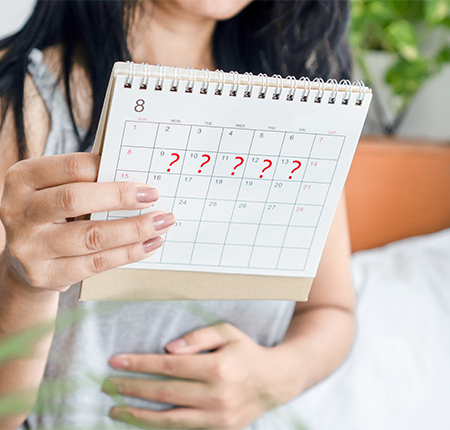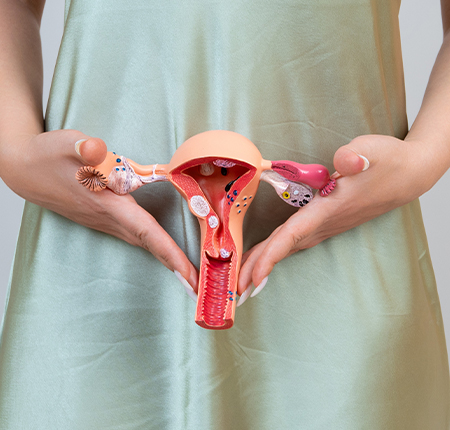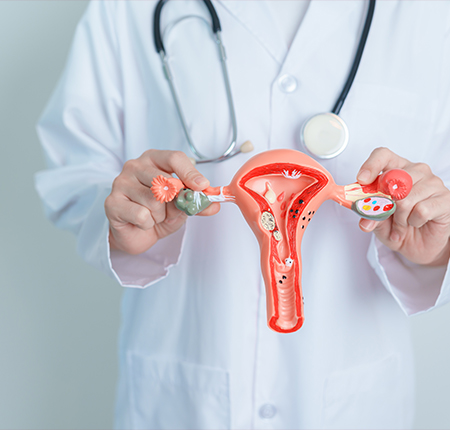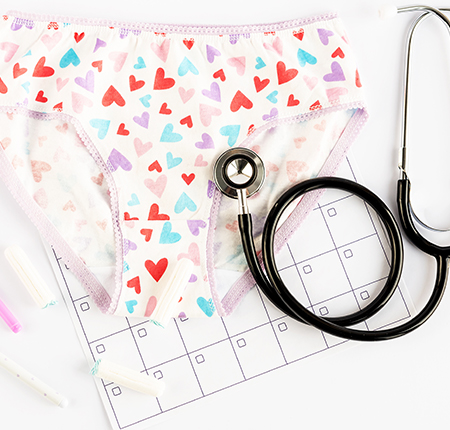
Menstruation is a natural and healthy function, and a beautiful phenomenon in a woman's life. It is the sign that the organism is ready to create a new life, and an imprint of femininity. But when it comes twice a month, there is also concern.
Is it normal to have your period twice a month? What does it mean if it happens and what are the causes? You don't have to panic, the causes are very varied and sometimes they are not even dangerous. Stay with us for some girl talk, and let's look together at what it means, why it happens, and how we manage our twice-monthly period.
What does a normal menstrual cycle look like?
As a rule, a healthy menstrual cycle lasts an average of 28 days, and can vary between 24 and 38 days, during which the body goes through the four phases (menses, follicular phase, ovulation and luteal phase). In teenage girls, a normal menstrual cycle can even exceed 38 days.
Similarly, the duration of menstruation, on average 5 days, can fluctuate between 2 and 7 days. This is what a normal menstrual cycle looks like. But every body is different, and the fact that a healthy period manifests differently from one woman to another is also perfectly normal. If you want to talk more about menstruation, HERE we talked without hesitation about everything you need to know.
What does it mean if you get your period 2 times a month?
Menstruation can come twice a month in the most varied situations - and they are not always worrisome. In adolescence, for example, it is normal to have an irregular cycle in the first few months - including a cycle 2 times a month. It just means you have an irregular cycle, and it may take a few years for it to settle.
It can also mean that you have a cycle shorter than 28 days (ie between 24 and 28 days). If the month has, say, 31 days, then it is possible to get your period twice in the same month without hiding any health problem. 
The phenomenon becomes cause for concern and may mean that it hides other conditions when the interval between the two periods is shorter than 24 days, or when they are accompanied by other symptoms:
Constant menstruation 2 times a month for 2-3 months;
Bleeding outside of menstruation;
Profuse flow during menstruation;
The need to change the absorbent every 1-2 hours;
Blood clots larger than the size of a coin.
Spotting or period twice a month?
It is important to pay attention to what you see when you ask yourself "why do I have my period twice a month". You should not confuse menstruation with spotting. The amount of blood is the key to tell them apart.
During menstruation, the bleeding lasts for several days and you need pads or tampons to effectively absorb the menstrual blood so that it does not stain your clothes.
Spotting, on the other hand, consists of a much smaller amount of blood - often just a few drops - and you don't need a normal tampon or absorbent, just a daily to avoid soiling your underwear. We recommend using organic cotton daily absorbent pads that keep your skin dry and let it breathe without irritating you with plastic or other chemicals.

Causes - Why do I get my period 2 times a month?
There are many and varied potential causes of early menstruation. From the harmless ones like a trivial menstruation 5 days earlier due to an irregular cycle, to more serious conditions like hormonal problems or uterine fibroids. Let's take them one by one and discuss each one.
Unique anomaly
You may get your period twice in the same month occasionally for no apparent reason and then everything goes back to normal. Such an isolated case is called a unique anomaly and should not worry you.
It simply means that you had a shorter menstrual cycle that month, after which it returned to its normal length. If no other symptoms appear or if they do not recur at regular frequencies, you can get over this anomaly without any worries.
Menstruation 2 times a month in teenage girls
And in the case of teenage girls, an earlier menstruation can happen, even twice a month. Especially at puberty, when hormones fluctuate a lot. It does not mean that the teenager has a health problem, but it is good to discuss it with the gynecologist.
Irregular cycle is commonly seen in the early years of menstruation, when its duration, frequency, menstrual days and flow can vary from month to month. According to studies, it can take up to 6 years for the body to adjust.
Endometriosis
The endometrium is actually the lining that covers the inside of the uterus and is shed with each period if a pregnancy does not develop. When these uterine-like tissues grow outside the uterus, a condition called endometriosis occurs. 
When the endometrium grows excessively, it means there is more tissue to shed, which can cause heavy or extra periods. Specifically, in addition to abdominal pain and other gastrointestinal symptoms, endometriosis causes irregular and heavy bleeding. They are just like a period, thus giving the impression that you have your period twice a month. Read HERE more about life with endometriosis and what other challenges it entails.
perimenopausal
Here we are talking about the years leading up to menopause - even a period of 10 years before menopause - when hormonal fluctuations start again and the irregular cycle can occur again. For example, cycle 2 times a month at 45 years old is a natural response to the alert rhythm of ovulation. 
So an earlier or later period, its absence or occurrence twice in the same month, the change in the flow, all can simply be indications that menopause is approaching. It means that a new period in your life is coming, which is natural and happens to all women, and which I have discussed at length in another article on the Enroush blog, which you can read HERE . However, if other symptoms appear such as very heavy flow or severe pain, talk to your gynecologist.
Thyroid problems
The irregular menstrual cycle is a problem often associated with thyroid problems, because this hormone has the role of balancing the hormonal processes in the body.
Too low (hypothyroidism) or too high (hyperthyroidism) levels of this hormone can disrupt your periods, from changing flow to changing length. It can even cause amenorrhea, that is, when menstruation is absent for several consecutive months.
So when the thyroid is not working optimally, the menstrual cycle can become longer or shorter, and you can wake up with your period 8 days earlier or even more, thus resulting in bleeding 2 times a month.
Uterine fibroids
Although not cancerous, growths in the uterus known as uterine fibroids can cause you to bleed and increase your menstrual flow. Girls who have family members with uterine fibroids are more likely to develop them as well. 
If you don't have other symptoms (pain, frequent urination, pain during intercourse), you may not even need treatment - because they diminish or disappear after menopause. But it's always good to talk to your doctor to decide together the healthiest approach.
Hormonal disorders
When you have an irregular cycle twice a month, your body may be indicating a hormonal imbalance. It can be a disorder at the level of estrogen, progesterone or testosterone.
All of these hormones have a role in ovulation, which means that a hormonal imbalance will also be reflected in an ovulation imbalance. Also, hormonal imbalances can interact with a lot of other functions in your body, which you can read about in more detail HERE .
Menstrual irregularity / irregular cycle
If you have a period after 2 weeks (2 times a month), it may be a result of a menstrual irregularity. It's called polymenorrhea, and it means you start your periods at intervals shorter than 24 days.
But it can also happen naturally that you get your period twice in the same month, without necessarily indicating a serious problem. This is the situation in which women with irregular periods find themselves.
We must keep in mind that a menstrual cycle is considered normal as long as it occurs at intervals of 23 to 38 days. So imagine, for example, that in a month you have your period after 33 days, the first day being at the beginning of the month. And because you have an irregular cycle, your next period comes after only 23 days, somewhere at the end of the same month.
It means that you start your period 10 days earlier than you expected, without being abnormal. It's just an irregular cycle that has timed itself to start at the end of the same month. The same can happen if you start your cycle 7 days earlier.
Contraceptive side effects
Birth control pills are normally meant to regulate your menstrual cycle. Moreover, they are prescribed in case of irregular menstrual cycle to keep it under control. Find out how birth control pills work and what other effects they have on your menstrual cycle by reading our article HERE .
But in the first few months of taking new birth control pills, it's perfectly normal to have spotting, irregular periods, and especially an extra period. It's a natural response to hormonal changes.
Likewise if you forget to take a pill one day. It may take a few months for your body to adjust and your periods to adjust. If it lasts longer or you have other symptoms, then it becomes a problem and you need to discuss it further with your doctor.
When is it advisable to go to the doctor?
The first sign that you should see a doctor is when you get your period twice a month for several months in a row. When it recurs frequently, it is very likely to indicate a health problem that needs treatment. 
It is also advisable to visit your doctor if you have other worrying symptoms, such as:
- Heavy bleeding with large clots;
- Heavy flow and the need to change the tampon/absorbent every hour;
- Abdominal pains;
- Pain or bloating during intercourse;
- Migraine, dizziness, headache, nausea, fatigue, fainting;
- Weight changes for no apparent reason.
Irregular cycle treatment 2 times a month
The first step to treating your twice-monthly cycle is identifying the cause. For example, to diagnose endometriosis or uterine fibroids, the doctor will do a pelvic examination or an ultrasound consultation.
Afterwards, the treatment will be different depending on the cause, age and health status:
For irregular periods in adolescence or perimenopause, contraceptives may be prescribed.
If you suffer from a health problem, the root cause will be treated first.
For endometriosis and uterine fibroids, hormone therapy or surgery can be tried.
Thyroid problems can be treated by taking synthetic hormones.
The most important thing is to always discuss any changes that concern you with your doctor. Always follow her recommendations to solve any health problem as quickly and effectively as possible, so that your menstrual cycle is regulated and you can enjoy normal periods.
Risk factors & complications
Just because you're prone to having 2 periods in the same month when you have certain risk factors, doesn't mean you're going to have them. But it's good to know them so you don't get scared and be prepared in case it happens:
Adolescence: During puberty, there is an increased risk of having irregular periods, getting your period every 20 days, more than 38 days, or even skipping a month.
Genetic factor: It is a risk factor, increasing your chances of having an irregular cycle based on a uterine fibroid, cyst or early perimenopause, if it has happened in the family history.
Hormonal problems: Thyroid or estrogen problems, hormone therapies and other hormonal imbalances can be the cause of irregular menstrual cycle and 2 periods in the same month.
Chaotic lifestyle: Radical weight fluctuations, stress, lack of rest and an unhealthy diet can cause hormonal imbalances and, by implication, too few or too many periods in a month.
In the absence of proper treatment, repeated 2 times a month periods can also lead to certain complications due to the loss of a large amount of blood. Anemia (with dizziness, fatigue, headaches, irregular pulse), difficulty identifying the period of ovulation and, implicitly, getting pregnant, are complications that can occur if your cycle is irregular for a long time.
How can you effectively manage your period twice a month?
You can feel overwhelmed when you get your period twice in the same month, but know that you are not alone! Between 14% and 25% of women have irregular periods, but this does not always mean a problem.
Did you know that when the cause is hormonal imbalances, the source of the problem may actually be your lifestyle? Activity level, diet and habits can be your allies or enemies, so we want you to know how to manage your twice-monthly period in a healthy way. Here are some useful recommendations that you can do at home:
Practice stress management techniques: they will help you relax, control your breathing rate and reduce agitation in the body;
Use suitable intimate hygiene products: throughout the month - and especially when you bleed, you need proper hygiene to prevent irritation or infection;
Eat a balanced diet: Eat nutrient-dense foods that can help prevent the anemia you're prone to when you bleed profusely twice a month.
Choose organic pads: We know it's not easy to deal with menstrual symptoms, especially 2 times a month, but a conventional product with toxic ingredients will make everything even more difficult. Enroush 100% organic cotton pads have super absorbency to support you even on heavy flow days, and protect you from irritation with only natural ingredients.

Frequently Asked Questions
Still haven't received the answer to the question you're worried about? You may find it below, where I've answered some of the most common questions about your period 2 times a month.
Can you be pregnant if you get your period 2 times a month?
Although it is more difficult to track your ovulation to identify your fertile period, it is definitely possible to get pregnant even when you have an irregular cycle, 2 times a month. Irregular bleeding and spotting are also normal during pregnancy, especially in the first trimester.
Is it normal for my period to come after 2 weeks?
This directly depends on your age and health. If it's an isolated case, and you're in puberty or perimenopause, it's normal to have irregular periods and come too late or too early - even as often as 2 weeks. On the other hand, it is not normal for this to repeat itself for several months, even when you suffer from a health, hormonal or other type of problem.
In teenagers, does menstruation 2 times a month signal a problem?
Especially in the first years of menstruation, the irregular cycle is normal and most often adjusts itself. Sometimes the process can take years. Menstruation 2 times a month becomes a problem in teenage girls when it is repeated for several months or when it is accompanied by other worrying symptoms. In this case, the doctor can prescribe contraceptives to regulate the duration and menstrual flow.
What does the cycle mean 2 times a month at over 45 years old
After the age of 45 we can talk about menopause. During this period, due to hormonal changes, the duration of the menstrual cycle can also change. If the follicular phase shortens, this can lead to more frequent ovulations and even 2 cycles in the same month.
What does it mean if the cycle comes earlier than 10 days?
Your period may start earlier as a result of hormonal fluctuations. It can happen at puberty or perimenopause, or based on chronic stress, various health problems, or certain medications. It's normal for your period to come faster sometimes. But if it is repeated for several months in a row, it may indicate a more serious condition and it is recommended to visit the doctor.
If I get my period just a week after I missed it, should I be worried?
Normally, the menstrual cycle lasts between 23 and 38 days. However, it is possible to have new bleeding after only 1-2 weeks, especially if you start taking birth control pills. This bleeding is normal and should stop after 2-3 months as the body gets used to the new amount of hormones.
It's not necessarily a cause for concern if you have a new period after just 7 days, but you should definitely talk to your doctor if this happens more than once.
What does it mean if I only menstruate one day in the middle of my menstrual cycle?
Bleeding for a day in the middle of the menstrual cycle is common and is called intermenstrual bleeding, or spotting, which I explained HERE when you should be worried. The causes can be varied, from stress and intense physical exertion to the change of some treatments or the appearance of health problems. If you suspect that bleeding indicates a problem, talk to your doctor.






















